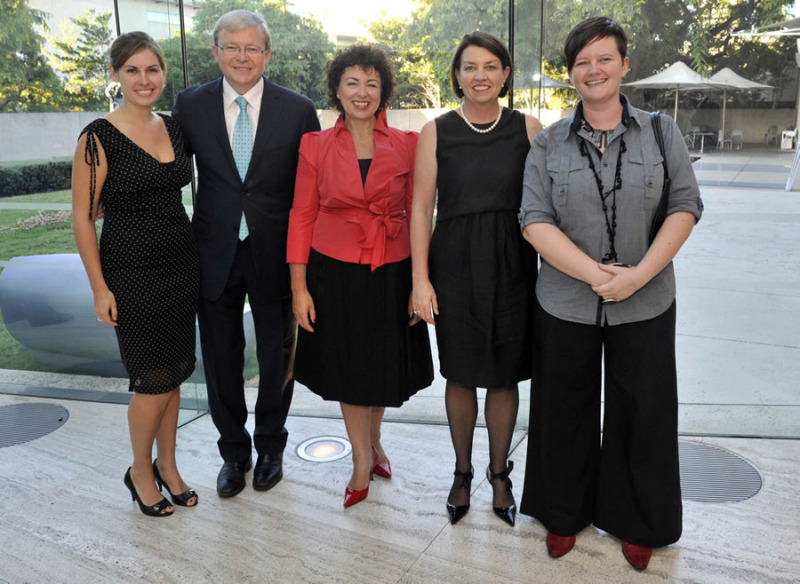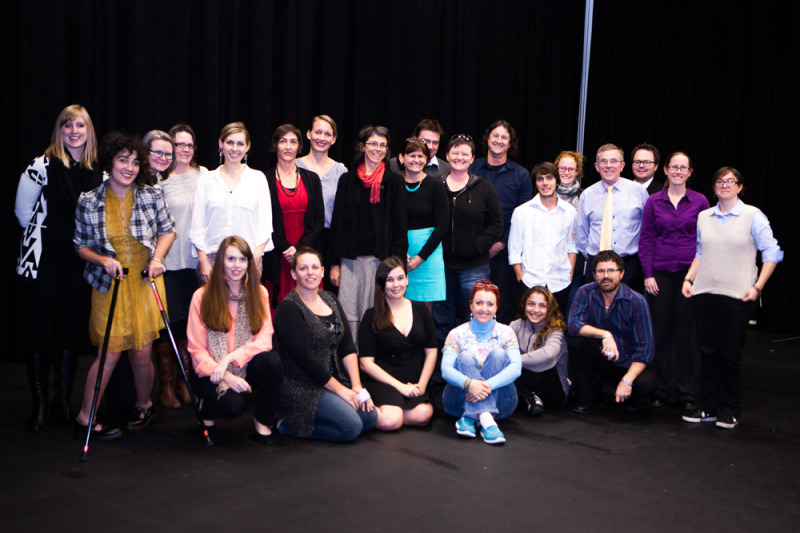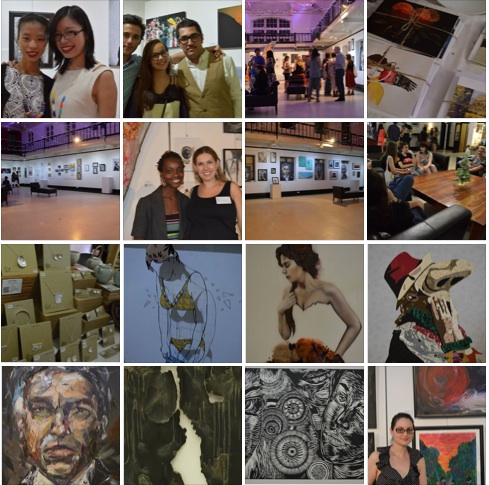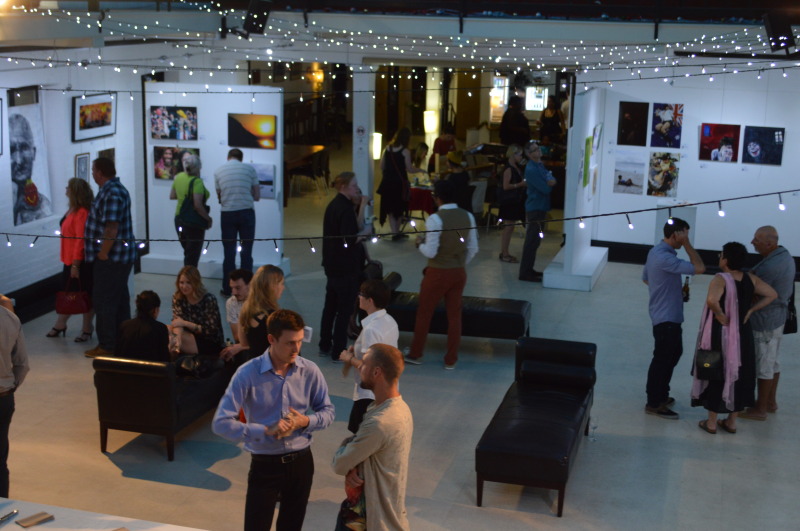This week we’re very excited to present an interview with Arts Manager Imogene Whittle, as part of our ongoing Arts Management Blog Series. Imogene has gained a plethora of experience and knowledge working within the arts in Australia and in this interview, she shares an invaluable insight into the industry. Read on to find out more about her own pathway into arts management; some of the challenges along the way; as well as some great advice for emerging artists/ arts managers.
Above image: Imogene Whittle (centre) at YAQ’s QLD Youth Arts Advocacy Meeting, 2013. Image provided.
Can you please provide a brief overview of where you are on your career path at the moment?
My last position was as Creative Director of Youth Arts Queensland (YAQ). Prior to that, I was Manager of Young People and the Arts Australia (YPAA). I am currently a stay-at-home mum with a one-year-old. I am working on launching an arts business support service organisation – ImPress Creative.

What has been your career pathway leading into arts management?
Straight out of high school, I studied Business Management and Japanese at university. I chose this course not because I had a specific career direction in mind, but simply because I knew that a business degree would be really useful to have and I’d studied Japanese at school. I knew I’d eventually find my passion and my industry down the track.
After graduating, I travelled to Japan and landed a job in an executive recruitment agency in Tokyo. I learnt a lot about effective listening, understanding other’s perspectives and motivations, and a lot about the job market. But it wasn’t my passion.
Another significant job I had before finding the arts was in a multinational business consulting corporation in Brisbane. I worked there for over two years before I really learnt the meaning and importance of finding an employer that aligned with my personal values.
I finally understood my passion and had the confidence to follow it; to work in the arts industry. I quit my steady job and undertook further university education in Creative Industries Management. The second year of my degree, I undertook a student exchange opportunity to Quebec. I focused on specialised arts management subjects that weren’t offered at my university. Plus, it was a great adventure.
Since then, I’ve worked at a literary festival in Canada, and then back in Brisbane at an independent artists centre, a music label, a youth arts festival and two youth arts peak bodies. I have chosen roles that have given me experience in various facets of management. I’ve been a Manager of administration, operations, volunteers, marketing and communications before becoming a General Manager. It’s the sum of all of these experiences that helped me accumulate my skills in my last role as Creative Director.
Have you participated in volunteering, internships or work experience?
I volunteered for events and festivals while at university. I was also heavily involved in the university clubs and societies. Although I was involved in them simply because I enjoyed it, the fact that I was President of the University Japanese Society helped me land my first job in Tokyo. All experience counts.
I undertook a volunteer internship through Backbone Youth Arts to deliver the 2008 2high Festival. The 2high Festival is a multi-arts festival and training ground for arts producers and leaders in Brisbane. I was Marketing Coordinator in a team of 12 other emerging producers, I was linked with a professional mentor, and it was a great hands-on learning experience. It was this experience that opened my eyes to the youth arts sector and I found that I was passionate about this work where I could really make a difference in the lives of young people.
I’ve since employed interns, and I’d recommend taking an internship if you’re considering it. Internships are awesome because you meet so many people in the industry who will vouch for you down the track. Having these connections is really important.
If you’re starting, have the confidence to knock on the door of anyone you’re interested in interning with and tell them exactly why you really want to intern with that company. I recommend continuing to follow up your initial proposal if you don’t hear back. Confidence and persistence are attractive.
Make sure you’re receiving something in return – university credit, or if you’re learning a lot and if you can see how it will really help your career. Don’t work yourself silly if you think you’re being taken for grated as free staff.
In the beginning what were the challenges in entering the arts management industry? If so, how did you overcome them?
Challenges:
1. Getting your foot in the door
2. Getting to know people in the industry
3. Self confidence and the belief that you can be successful
4. Being taken seriously as an arts manager when it’s your true aspiration, but you don’t actually have the experience yet.
How to overcome these:
1. Volunteer, do internships and take jobs that will give you the sum of all experiences – contract, part-time and temp. You don’t need to work for your dream org straight away.
2. Do your research and keep a coffee list – a list of professionals you’d love to chat with and invite out to a cup of coffee. Contact these folks when you think the time is right. At least by having this list, you’ll clarify for yourself who’s who in the industry and what opportunities to look out for.
3. Join LinkedIn and add contacts once your paths cross (keep Facebook just for people you consider friends). Eg, if you meet someone once at an art exhibition opening.
4. Attend conferences – it’s a great way to meet industry professionals and it shows initiative. Attend everything you can and collect and share business cards (make your own). If tickets are too expensive, you can often ask in the lead-up to the event for a student price or undertake some volunteering in return for a discount.
5. To be a great manager, you need a mixture of knowledge, experience and character. I’ve realised that I’m not waiting for when I hit a great pinnacle of perfection – rather, improving these is a lifelong journey.
6. How to be taken seriously? Firstly, nail your self confidence. Now without pretense, call yourself an ‘emerging manager’. For example, are you passionate about circus and arts management? Introduce yourself as an Emerging Circus Manager. You’ll be remembered, and it’ll help with getting your foot in the door for the exact experience you want. You can apply the same rule to any artform.


What do you find rewarding about working in the Arts Management industry?
I really think it’s rewarding being able to help out others with their career path, or with their business. I found it easy to be passionate about the youth arts industry and helping young people to make their dreams a reality.
I get a kick out of researching, collating and representing large groups of people’s ideas – for use of reporting to government in ministerial meetings, response to policy, or shaping organisational programming.
I always love holding events. I get a real buzz from being able to set an atmosphere and seeing instant reactions from audiences.
What lessons have you learnt the hard way in terms of your work?
I have learnt:
• Always diversify your income streams, particularly when you’re in receipt of government funding. The last two organisations I have worked for have unfortunately closed as a result of government defunding, and insufficient alternative income.
• Work to achieve significant outcomes. It’s not the hours you put in, but the outcomes you achieve at the end of the day.
• Don’t work to simply please others – your manager, your funding body etc. You also need to be able to have the perspective to know when you’re achieving great work, rather than being reliant on external praise every time.
• Understand your financials. You need to take the time to deeply understand and take ownership over your financials – even if you also rely on a bookkeeper or a treasurer.
• Keep great records of your work. You never know when you’ll need to go back to verify something. Soon after completing a project or event, keep a summary report of all outcomes, financials, statistics, marketing statements, feedback etc – even if it’s one page. Your future self will thank you.
• If you make a verbal agreement, follow it up with an email in writing.
What do you find challenging about working in the arts management industry?
There’s always uncertainty around making long-term plans for an organisation that’s very heavily dependent on government funding. It’s shortsighted to be looking one year, or even three years in advance.
Prepare yourself for working ad hoc hours and the wages aren’t great, compared to the private sector. But the benefits are being personally enriched, and working for a cause that you can be truly passionate about.
What does government need to do to further support the arts industry as a whole?
I’ve been advocating for the youth arts industry for five years now, so I could go on and on. But I’ll try to contain it to these points:
Government expects growth of the arts sector and of young creative entrepreneurs, yet, the places that provided this support network are dwindling: the peak bodies and youth arts organisations are being defunded, youth mentorship schemes are being cancelled and micro- grants are dwindling. Governments should commit to doing more to further facilitate and enable the participation of children and young people in the arts, and to enable and empower the support networks around them.
It’s vital for the future growth of Australia’s arts industry as a whole to invest in the youth arts sector. Without a long-term focus on changing the behaviour of children and young people so that they can be the torchbearers of long-term future change, it is unrealistic for Government to expect that any long-term change of the arts sector will transpire – or to expect an increase in professional artists, audience members, or community of arts.
I believe school leavers need to be encouraged and educated on the growth opportunities of a career in the arts. At the same time, they should be taught the skills from a young age to be entrepreneurial and to create their own path. Too often, artists’ dreams are quashed by the question ‘what’s your day job?’. The reality of the situation is that the arts industry and creative industries are huge and the expert behind-the-scenes roles exist just like other industries. Eg – ever thought of being an arts accountant?
Government needs to publicly declare the intrinsic value of arts participation for young people. I’d love to see a public service announcement – like ‘Life Be In It’ for the arts.
I’ve also done much advocacy about increasing cross-sector collaboration, improving accessibility and reducing ‘red tape’ experienced by youth arts organisations through partnerships. I’d like to see more collaborations with non-arts government departments for benefits to the youth arts industry, to the wider arts industry, and to increase public engagement with arts and culture.
Where is your arts management career leading your for the future?
In the last year, my career has taken a back seat recently for me to me become a mother. In that time, I have been doing some work from home and I am now focusing on launching a virtual assistant business for the arts, ImPress Creative.
I am filling a gap of high-end temp and contract support for arts organisations, events and membership organisations. They often can’t afford to commit to hiring staff, but require high level support work.
Contact: imogene@impresscreative.com.au


What advice would you give to those wanting to get into Arts Management?
• Take on all opportunities that come your way and know that everything you undertake will help build and contribute to your skill-sets and networks. Eventually you’ll find something that’s right for you, and you’ll realize it’s something that glues all of your past experiences into one.
• When you’re getting experience, no job is below you. Instead, remind yourself of what that job contributes to the big picture. Besides, even when you become Director of an arts organization, anticipate still emptying your own bins.
• If you’re keen on management, learn as many skills as you can: marketing, hr, finance, systems and operations, philanthropy, technical, administration etc.
• Keep learning
• Do financial management and financial reporting training
• Listen to your customers. ‘Arts for arts-sake’ is one thing, but if you’re actually trying to sell something, make sure you have an audience or there’s demand. (For example, working in a service organization I surveyed about industry needs and gaps in professional development to ensure sure what I was doing was relevant).
• Lead by example
• Adopt the traits of amazing managers you’ve worked for and make them your own.
• Be nice. I have seen folks burn bridges at work, and word travels fast in this united industry. Besides, life’s too short.
• Follow your passion.
Thanks Imogene for your time and sharing your expertise! For more interviews in this series check out our blog: click here.
